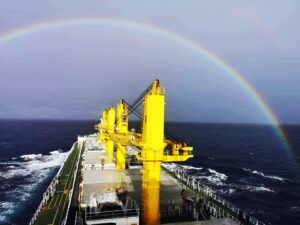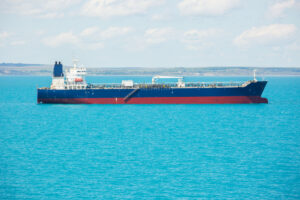
London-based Anglo American, a global mining company, announces that its newly launched LNG dual-fuelled Capesize+ vessel, the Ubuntu Harmony, has loaded its first cargo of iron ore from its Kumba operations in South Africa.
The Ubuntu Harmony, a 190,000 tonne bulk carrier, flagged in Singapore and owned by U-Ming Marine Transport, is the first of ten LNG dual-fuelled new-build ships that Anglo American will introduce to its chartered fleet during the course of 2023 and 2024, delivering an estimated 35% reduction in CO2 emissions compared to ships fuelled by conventional marine oil fuel.
According to Anglo American, the Ubuntu fleet is a key component of Anglo American’s ambition to achieve carbon-neutrality for its controlled ocean freight by 2040, with an interim target to reduce emissions from these activities by 30% by 2030.
It is worth mentioning that the vessel completed bunkering in Singapore in early January with LNG provided by Shell Eastern LNG. It arrived in Saldanha Bay, South Africa on 19 January to load a full cargo of iron ore that will be transported to customers in China. The Ubuntu Harmony will be followed by its sister ship Ubuntu Equality, the fleet’s second vessel, which is expected to load her first cargo in February in South Africa.
Peter Whitcutt, CEO of Anglo American’s Marketing business, said: “We are proud to see the Ubuntu Harmony begin its voyage transporting future-enabling products from our mines to our customers around the world. This milestone cements our vision to be a leader in low carbon shipping, a natural extension of our commitment to achieve carbon neutrality across our operations by 2040.”
Nolitha Fakude, Group Director of Anglo American for South Africa, said: “The metals and minerals we provide play an important role in helping key industries decarbonise. Transporting them in a sustainable way is a key part of this effort and the introduction of the Ubuntu fleet – named after the Zulu word meaning ‘humanity to others’ – helps us accelerate our transition to sustainable ocean freight.”
Source: Anglo American



